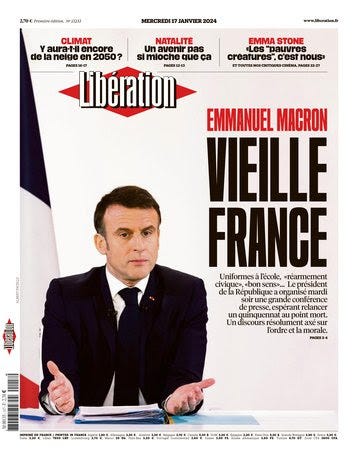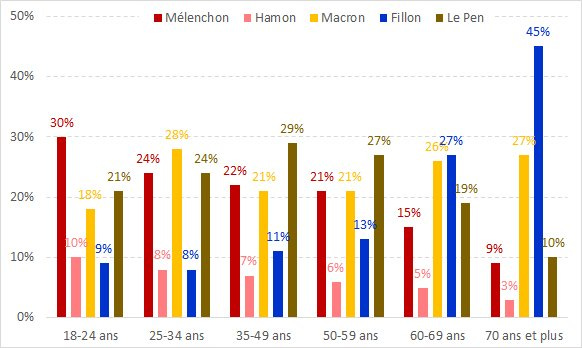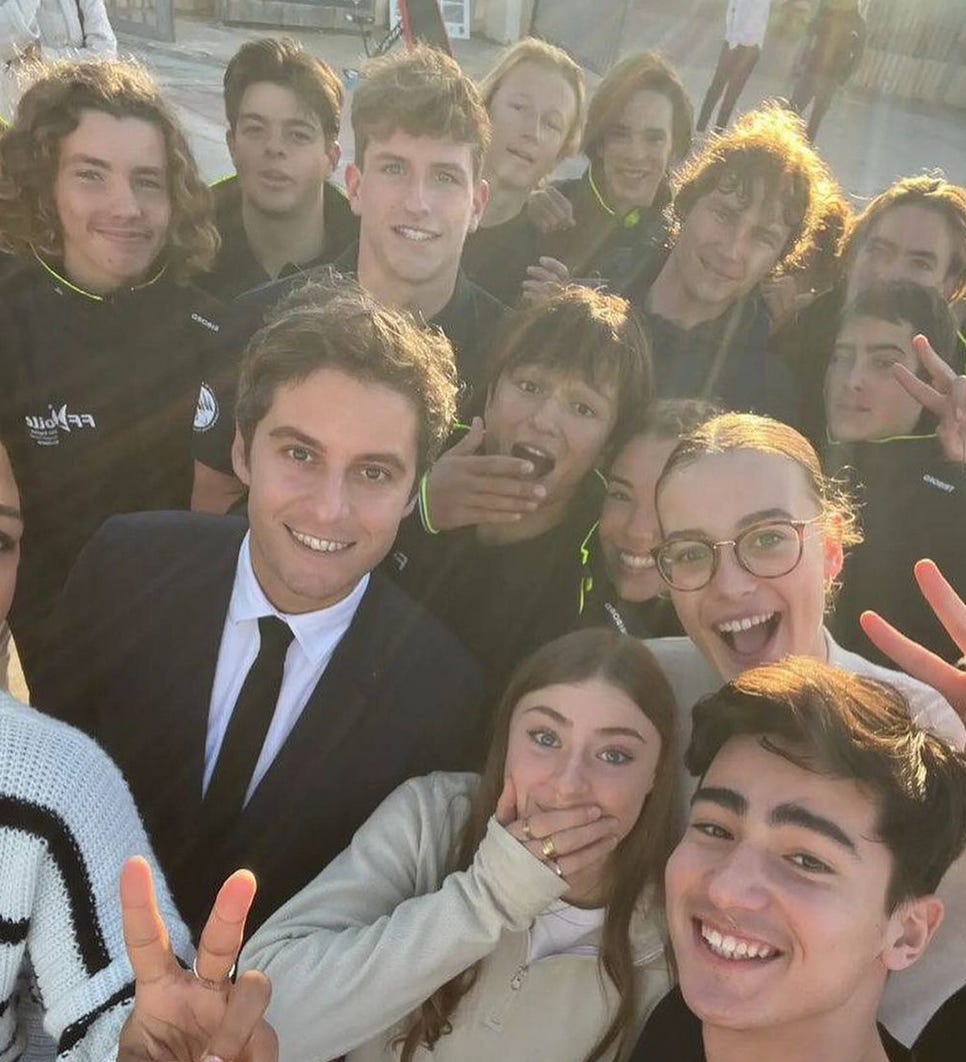The Old Macron On The Mountain
The president surfed a wave of youthful enthusiasm in his first election. Lately, critics say he sounds like an elderly politician from yesteryear.
While discussing President Emmanuel Macron, 46, a French friend last year made a casual remark that caught me off guard: “It’s strange, because he seems young but he often acts and talks like an old man.”
Huh? I mean, we’re talking about the youngest president in the history of post-World War II France. He was 39 years old when first elected in 2017. Only Napoleon was a younger head of state. Macron began his first term brimming with fire and energy, a non-stop free particle in constant motion. He spoke strongly to the nation’s youthful generation of entrepreneurs, in a hurry to change everything.
So what happened?
Marcron’s evolution over the past 6+ years is typically framed along the left-right spectrum. His rallying cry in 2017 was that he wanted to smash the classic political alignment and pursue policies that were “neither left nor right.” He spoke about work reforms and making France more pro-business, while also promising strong action on the environment and increased support for workers whose industries were disrupted. Mush it all together, and this meatball of politics seemed to be slightly center-left, because, after all, Macron had served under the center-left Socialist Party government.
In the subsequent years, he drifted steadily to the right, to the point where he’s clearly center-right (and maybe just plain old right). This has been rationalized as an attempt to cut off oxygen to the far right by embracing culture war rhetoric and clamping down on immigration. Judging by Marine Le Pen’s continued strength in the polls and mainstream makeover, it doesn’t seem to be working (even if it got him re-elected in 2022).
But another way to look at Macron’s evolution is through a prism of generational talk. This shift came into focus in mid-January when Macron spoke with journalists at an annual press conference to mark the beginning of the political year. During the 2.5-hour session in front of 200+ journalists, Macron announced a slew of initiatives.
Yet the ones that stood out seemed aimed at conjuring a mythical France of yesteryear. Macron said the government will launch a pilot program to test uniforms in schools, with the goal of expanding it nationwide in the next few years.
This is part of what he described as a “civic rearmament” to address the flagging moral compass of The Youth and instill them with proper Republican Values. He wants to require the learning of La Marseillaise in schools, establish ceremonies for awarding school diplomas, and expand a program that would require public service for 16-year-olds, dadgummit!
Also, he intends to announce measures that would limit the amount of time those confarnit kids spend on their screens! And a compulsory period of civic service for 16-year-olds.
The goal: "France remaining France," he said, embracing a phrase beloved by the right. "Every generation must learn what the Republic means - a history, duties, rights, a language, respect… and they must learn it from childhood."
Because this came just a few weeks after a wildly controversial new immigration law was shoved through, for many it seemed like the final confirmation that Macron had tilted fully to the right.
But he wasn’t done. Shortly before his appearance, the national statistics agency released data that less than 700,000 babies were born in France in 2023, the first time that number had fallen below such a threshold since WWII. Alarmed by the falling birthrate, Macron announced a program to get the French to shake their baby makers.
Some of those measures were entirely reasonable, like increased paid family leave for both parents. Great! Others touched a nerve, such as free infertility tests starting at age 25. Macron (who has no children of his own) declared infertility a “scourge” and the “taboo of the century.” He framed the need to have more babies and address infertility as a cause critical to France’s future, echoing the rhetoric of far-right politicians across Europe who have been imploring citizens to have more babies to ensure their cultural heritage.
"Our France will also be stronger by relaunching its birth rate. Until recently, we were a country for which this was a strength [...] It's been less true in recent years," according to Le Monde.
Of course, one gender tends to be primarily responsible for the baby having. As such, female equality activists resented the pressure to effectively define their reproductive choices and bodies as tools for restoring France’s glory.
Anne-Cecile Mailfert, head of the Women’s Foundation, criticized these “demographic rearmament” plans by tweeting: “Leave our uteruses alone.”
It’s no surprise that opponents across the political spectrum dumped on Macron. That is just reflexive at this point. But they very consciously tried to depict Macron as a man of the past.
The left-leaning Libération newspaper summarized Macron’s remarks as an "outdated not to say conservative vision" of France, adding: “having been on the move for six and a half years, he will be able…to prepare for the future by looking back. Daring.” Le Monde said the president was "flirting with nostalgia for a France of old." Marine Tondelier, the national secretary of France’s Green party, EELV, said it was the speech of a “reactionary technocrat” that was “scary … and old fashioned”.
Christian Salmon, writing in Libération, said Macron had reached back further than he intended. He wanted to invoke the post-WWII France of de Gaulle. Instead, he sounded like someone from a previous century.
“This president, elected for his youth, and because he offered hope for a renewal of political life, is adorned at the start of his second term with all the faults of old politics,” Salmon wrote. “The one we saw miming de Gaulle seated in front of journalists in a remake of the old press conference, got the wrong Republic, he spoke like a President of the Council of the Third Republic.”
The cover, with the headline, “Old France,” summarized this neatly:
Other politicians, primarily from the left, also piled onto the Old Man Macron theme.
“Emmanuel Macron is proof that you can be quite young but with the ideas of a reactionary old man,” tweeted Social Party spokesman Arthur Delaporte.
If I Could Turn Back Time…
While the Old Man label has become more pronounced, some version of it has been attached to Macron from his teenage years.
According to a 2017 profile by France 24, Macron seemed in a hurry to grow up:
“As a teenager and young adult, Macron was always hanging around older people – having dinners with his teachers, avoiding the advances of girls his own age, according to his former classmates.”
Famously, the 15-year-old Emmanuel pursued his 39-year-old drama teacher, Brigitte Trogneux, who later left her husband and married Macron.
In a France 3 TV documentary, Trogneux (now Macron), said: “He was not like the others. Most definitely, he was not like the others. He was always with the teachers, he was always discussing issues with the teachers. He had books, always a lot of books. He was not a teenager. He had a rapport with adults – teachers, school directors – he had an equal relationship with them.”
Still, when Macron was elected in 2017, it was in large part because he struck a chord with voters of all ages in the first round of voting:
Very gradually, his attitude — and policies — in office began to turn off younger voters. Work reforms were not popular, and there was a feeling he was not delivering on environmental promises. But there were also symbolic gestures, like his courting of France’s conservative hunting lobby, his embrace of Catholic groups, and a general tone that often felt, well, hectoring.
During a public event in June 2018, Macron went out to greet a crowd of young people. One teenager, clearly excited to see Macron, called him by his nickname, “Manu.” Manu no likey. The president proceeded to scold the teen while insisting he must refer to him in official settings as President Macron and just generally behave himself.
When running for re-election in 2022, Macron’s support among voters under 60 had slumped badly. This was particularly notable in the 25-34 age group that he won in 2017, but fell to third in 2022 behind far-left Jean-Luc Mélenchon and far-right Marine Le Pen. Older voters saved Macron’s bacon. He overwhelmingly won voters over 60.
Almost two years into his second term, with no possibility of running for a third, Macron is now considering his legacy. This term so far has been defined by the backlash and protests against his controversial pension reform (which means younger people will have to work longer), the outcry over the immigration reform, and most recently a groundswell of anger by the nation’s farmers.
So in late December, he announced a shakeup of his government, dumping Prime Minister Elisabeth Borne, 62, for France’s political Doogie Howser, the 34-year-old Gabriel Attal. Recognizing he may be too long in the tooth to do it himself, it appeared that Macron wanted to inject his government with some youthful vigor.
See if you can guess which one is France’s new Prime Minister:
Chris O’Brien
Le Pecq





